Treasury Secretary Henry Paulson said he is confident there will soon be an agreement to help thousands of homeowners avoid mortgage defaults by temporarily freezing their interest rates.
Paulson told a national housing conference that this effort involved a "pragmatic response" to current realities as the economy goes through the worst housing slump in more than two decades. The number of homeowners struggling to meet higher payments because their initial introductory rates are resetting is currently soaring.
Paulson and other top Treasury officials have been holding talks with major players in the mortgage industry over the past several weeks to hammer out an agreement that would freeze the lower introductory rates to keep them from resetting to higher levels for a period of years.
"We are working aggressively and quickly, utilizing available tools and creating new ones, to help financially responsible but struggling homeowners," Paulson said in a speech to a national housing conference sponsored by the Office of Thrift Supervision.
Length of Freeze
One of the outstanding issues is how long the freeze will last. Some government regulators are pushing for five to seven years but investors, who will see lower payments on the loans, are arguing for a shorter period of one to two years.
An estimated 2 million subprime mortgages, loans offered to borrowers with spotty credit histories, are scheduled to reset to much higher levels by the end of 2008. Those resets will push the payment on a typical mortgage up by $350 per month, taking it from $1,200 currently to $1,550.
Paulson said he believes the disagreements can be resolved without delay. Some expect the administration to introduce the completed deal later this week, but Paulson was not as specific in his remarks, saying only, "I am confident they will finalize these standards soon."
In an interview on CNBC after the speech, Countrywide Financial Chairmanand CEO Angelo Mozilo praised the proposal.
"It's a good plan," said Mozilo, head of the nation's largest mortgage lender. "We've already done about 55,000 of these loans in terms of saving them from the reset. We'll do 70,000 by the end of the year. And we expect to do another 40,000 to 50,000 next year depending on where rates go."
Paulson has been hashing out the plan's details with other top regulators, loan servicing companies and banks, including JPMorgan Chaseand Wells Fargo.
As it stands, loan servicers are being asked -- but not mandated -- to give extensions of two to five years for subprime mortgages made to borrowers with weak credit that are due to reset at higher rates in the coming years.
Relief Is Limited
The freezes would apply only for borrowers who are current on mortgage payments but unable to afford loans when they adjust to higher interest rates -- and sometimes dramatically higher monthly payments. The Federal Deposit Insurance Corp. estimates that 1.1 million borrowers are in that situation.
But for an estimated 400,000 borrowers already late on payments before loans reset at higher rates, "there may be no alternative except for foreclosure," Michael Krimminger, an FDIC special policy adviser, said last week at a congressional hearing.
Nevertheless, Krimminger said, borrowers who are current on their loan payments after two years are likely to be able to repay at that rate over the long run.
It isn't just the resetting of rates that's problematic. FDIC officials note that many subprime borrowers received starter rates that were not especially low at the time: typically around 7 percent to 9 percent, when rates as low as 5 percent were common for borrowers with strong credit.
The plan hatched by government and industry is also intended to benefit investors who purchased these risky mortgages. Agency officials counter criticism from investors concerned the plan will deny them potential profits by arguing they will be better off in the long run through the loan modifications. It spares them the cost of a foreclosure, which can run around $50,000, and decreases the likelihood of default.
'Investors Will Benefit'
"Lenders and investors will ultimately benefit," Sheila Bair, chairman of the Federal Deposit Insurance Corp., said in an October speech in which she unveiled the idea to investors. "You'll come out ahead of the game with a performing mortgage that's being paid versus having a loan that's in foreclosure."
Initially, investors gave a chilly reception to Bair's proposal. But since then, Democrats have been moving forward legislation -- ardently opposed by lenders -- to allow home mortgages on primary residences to be modified in bankruptcy court.
Worries that the bankruptcy proposal would gain further steam has made widespread loan modifications began to look more appealing to the mortgage industry, said Jaret Seiberg, a financial services policy analyst with Stanford Group.
Plus, "the industry realized how time-consuming and expensive it was to restructure these loans on a borrower-by-borrower basis," he said.
While the Treasury Department-organized effort won praise from Democrats last week, some experts said it would still face resistance from investors in complex securities backed by mortgage loans.
'Definitely Be Lawsuits'
If the Treasury Department pushes modifications that are against the interest of investors, "there will definitely be lawsuits," said Mark Adelson, a mortgage securitization consultant.
During the sunny days of the housing boom, many buyers were banking on the prospect that they could refinance into more affordable loans as the value of their homes soared.
Now that home prices are dropping in large parts of the country, and broader economic conditions are worsening, those borrowers are likely to face trouble even with their introductory loan rates extended for a few years.
"It's not the mortgage that's the problem" said Christopher Thornberg, a principal with Beacon Economics in Los Angeles.
While the market was soaring, he said, homebuyers simply paid far too much for their homes and are now facing the consequences.


